Australia is sending soldiers to guard its state borders in a bid to stop Covid-19 outbreaks from Sydney spilling over, as the Delta variant shows no sign of coming under control.
To make matters worse, Sydney’s Delta outbreak has not peaked and residents must brace for more deaths, authorities said on Wednesday, as Australia’s largest city continued to break records for new daily infections despite a nearly two-month lockdown.
‘We haven’t seen the worst of it and the way that we stop this is by everybody staying at home,’ New South Wales Premier Gladys Berejiklian told reporters in Sydney, the state capital.
Australia’s outbreak of the highly infectious Delta variant has spilled over to neighbouring New Zealand, where the country’s first community case of Covid-19 in six months was linked to the New South Wales state.
The single infection sent New Zealand into a snap nationwide lockdown on Tuesday, with the city streets left largely deserted on Wednesday.
New Zealand and Australia enforced similar policies based on the premise of ‘Zero Covid’ and were largely virus free for months. But the new outbreaks, coupled with the poor vaccine rollouts of the two countries, are undermining those efforts.
Scientists have warned ‘zero Covid’ is near impossible with the Delta strain, which is many times more infectious than the original virus that emerged in China.
In Australia, where more than 25 million are under lockdown, the Premier of Queensland has been forced to request troops to be sent to the border with New South Wales to help enforce tighter restrictions and stop the highly infectious Delta variant from passing through.
Annastacia Palaszczuk has repeatedly expressed fears about the rising number of cases in NSW and how that could spill over to Queensland, while chief health officer Jeannette Young said one Delta Covid-19 case in the state could spark another lockdown.
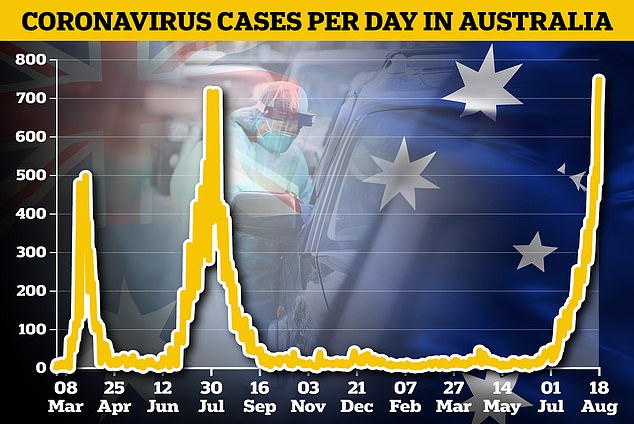
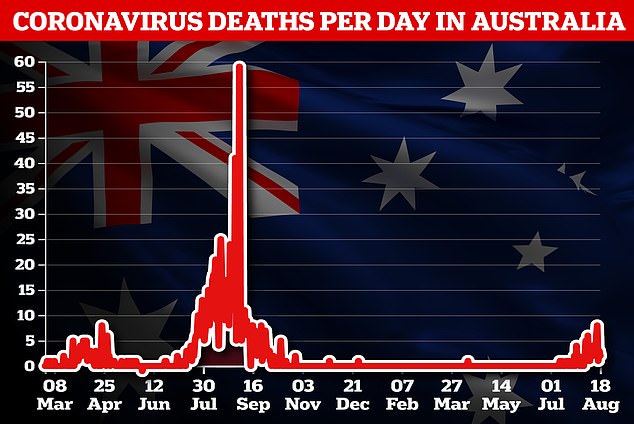
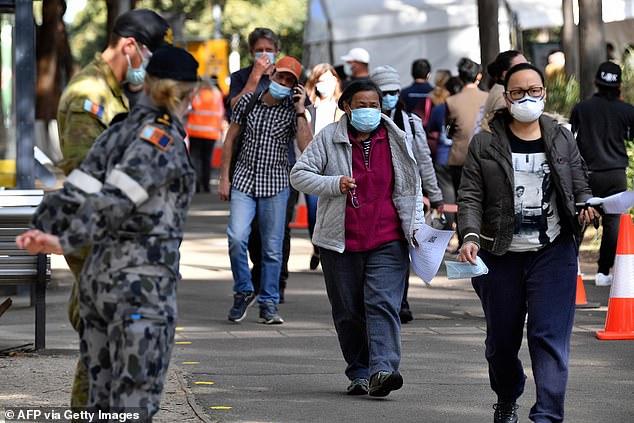
Australia is sending soldiers to guard its state borders in a bid to stop Covid-19 outbreaks from Sydney spilling over, as the Delta variant shows no sign of coming under control
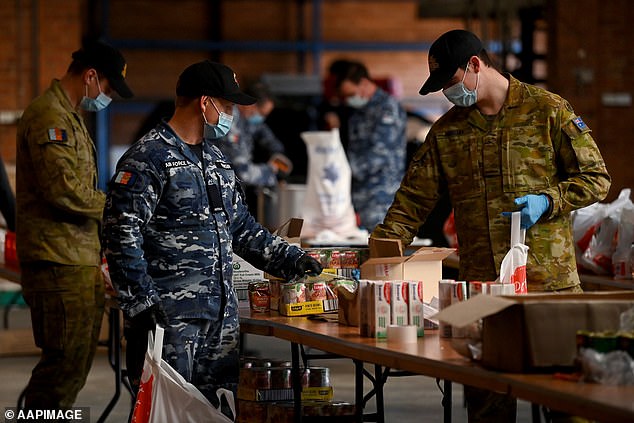
To make matters worse, Sydney’s Delta outbreak has not peaked and residents must brace for more deaths, authorities said on Wednesday, as Australia’s largest city continued to break records for new daily infections despite a nearly two-month lockdown
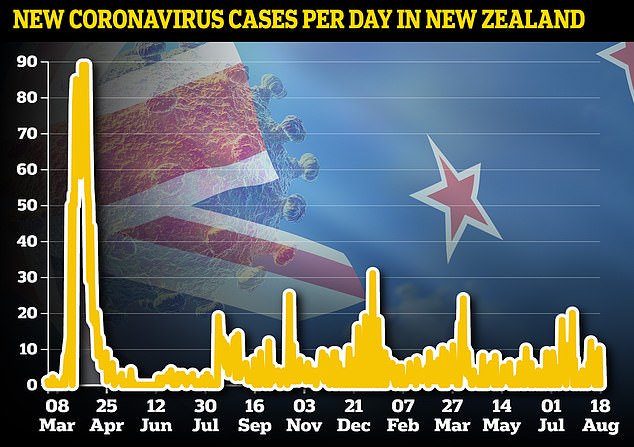
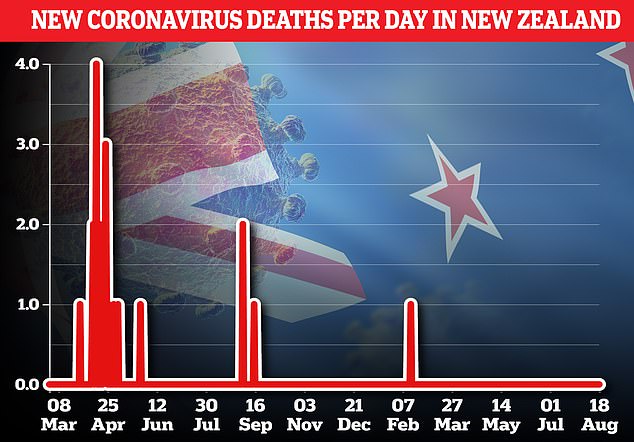
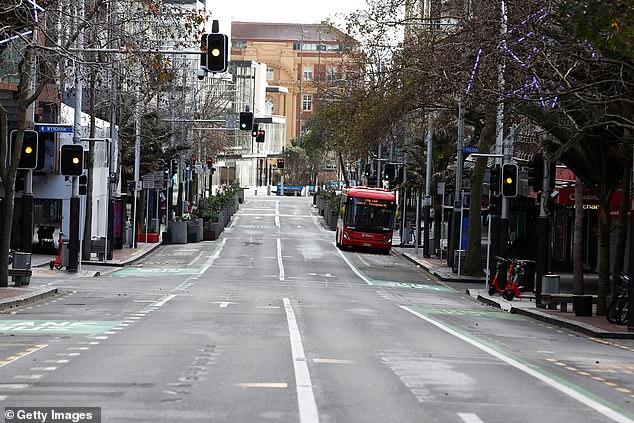
Australia’s outbreak of the highly infectious Delta variant has spilled over to neighbouring New Zealand, where the country’s first community case of Covid-19 in six months was linked to the New South Wales state
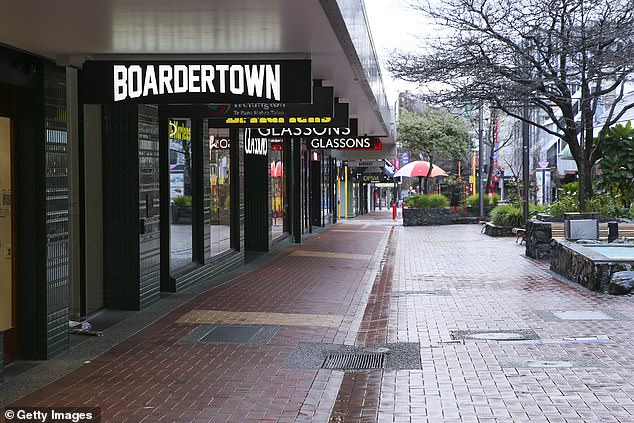
The single infection sent New Zealand into a snap nationwide lockdown on Tuesday, with the city streets left largely deserted on Wednesday
New Zealand is plunged into lockdown as Delta variant cases rise to 10
Australia’s rapid outbreak has spilled over to neighbouring New Zealand, where the country’s first community case of Covid-19 in six months was linked to the New South Wales state.
The single infection sent New Zealand into a snap nationwide lockdown on Tuesday, with the city streets left largely deserted on Wednesday.
Prime Minister Jacinda Ardern warned that Kiwis must brace for additional Covid-19 cases from the new outbreak.
New Zealand had been virus-free and living without curbs until Prime Minister Jacinda Ardern ordered a snap 3-day nationwide lockdown on Tuesday after a single case of the Delta variant was found in the largest city Auckland.
The number of COVID-19 cases had risen to 10 on Wednesday, although modelling suggested numbers could rise to 50-100.
‘From the experience of what we’ve seen overseas, we are absolutely anticipating more cases,’ Ardern said.
She said one of the new cases was a nurse at Auckland Hospital and another was a teacher at a high school, both representing high-risk environments for rapidly spreading the virus.
‘We’re expecting more,’ she said as officials revealed modelling predicted the cluster grow to 120 cases, even with stringent restrictions in place.
It is the first sign the mutant strain could undermine the 19 months of economically-crippling restrictions New Zealanders have had to endure to pursue the elimination strategy.
The initial infection, a 58-year-old Auckland man, ended a six-month run without community transmission in New Zealand, which has recorded only 26 Covid-19 deaths in a population of five million since the start of the pandemic.
Ardern said investigators were trying to work out how the man caught the strain linked to Australia.
‘Our case has originated in Australia, now the job we have is to work through how and when it got here,’ she said.
‘The natural place to start is to look at our managed isolation (border) facilities.’
The move to lockdown will put the country ‘in a much less risky position’, she added at a media conference.
New Zealand will be in level 4 lockdown, the highest alert level, for at least three days, while Auckland will remain in lockdown for seven days.
The national lockdown – New Zealand’s first in 15 months – is scheduled to last three days, with Auckland and the nearby Coromandel area facing restrictions for a week.
In the capital Wellington, few people ventured out in the city centre, which would normally be bustling with shoppers and office workers, while television footage showed similar scenes in Auckland.
Panic buying erupted after the lockdown announcement on Tuesday, with people stocking essentials at supermarkets despite repeated assurances from the government that there will be no shortage in supplies.
Meanwhile, Businesses and schools scrambled to move online.
Advertisement
On Wednesday night the Premier requested 100 soldiers be deployed along the border with NSW from the Federal government.
Most will head to the Gold Coast to help police and SES volunteers at border vehicle checks.
It follows the announcement 50 more police would be sent to the border on Tuesday.
The NSW border will be strengthened after that state’s new infections jumped to 633 new locally acquired cases on Wednesday, up from 452 cases the day before.
Australian virus expert James McCaw has warned that NSW is on track to seeing more than 2,000 cases a day if the current infection rates continue.
The Delta variant’s reproductive rate has shot up to 1.3, as dozens of exposure sites are recorded across regional areas including a busy Kmart, five Woolworths and two Aldi supermarkets.
The University of Melbourne professor, who advises the federal government on its coronavirus response, said the rate at which infections are picking up pace is ‘deeply concerning’.
‘It could go lower too. Our models show the possibility of increases and decreases, but I think it’s more likely to be well over 1,000 and up to 2,000 within a month or so,’ he told the Sydney Morning Herald.
‘The situation in NSW is a real and present threat to Queensland,’ Ms Palaszczuk said on Wednesday.
‘We want to put tighter restrictions on our border… at the moment there are too many people crossing our border.’
The classification of essential workers allowed to cross from NSW to Queensland would be further examined to further restrict movement, Dr Young said.
‘[Authorities will] go through all the people who may need to cross and work out if they are absolutely essential,’ she said.
The director-general of the premier’s department will conduct the review and new restrictions will come into effect next week.
The announcements came as Queensland said a number of Covid restrictions would ease from 4pm this Friday, including the return of community sport this Saturday.
Deputy Police Commissioner Steve Gollschewski said police would continue the ‘very rigid application’ of public health orders at border checkpoints.
Queensland has also shut its border with New Zealand in response to 10 new Delta cases there. Under new restrictions, inbound passengers from the country must quarantine for 14 days in a hotel.
Dr Young says border closures and lockdowns remain the best health responses to outbreaks until 70 per cent of the population is vaccinated.
‘Then people will be able to go about their lives,’ she said.
‘Otherwise, I can see in the future that the people who aren’t vaccinated are going to have to minimise their lives to protect their own health and safety.’
Meanwhile, Victoria recorded 57 cases of Covid on Wednesday, its biggest daily total this year and more than double compared to the previous day.
The massive spike likely shatters hopes Melbourne’s outbreak will end anytime soon and makes a lockdown extension beyond September 2 highly likely.
Millions are banned from leaving their homes for all but ‘essential’ reasons, with masks mandatory anywhere outside, a 9pm – 5am curfew in place, and even playgrounds roped off.
In NSW, medics are preparing for the huge influx of positive cases that may need to be hospitalised. At the centre of those concerns are a staggering 3,803 mystery cases that are yet to be linked to a source.
In order to free up staff and hospital capacity, the NSW Ministry of Health made the shock move to cancel almost all surgeries in the state’s private hospitals.
Under the ‘special conditions’ order only ’emergency’ procedures will be allowed to go ahead from August 23. Similar non-urgent surgeries have already been halted in public hospitals.
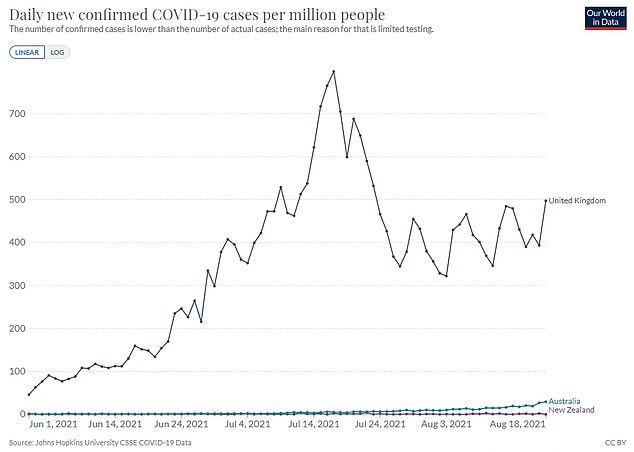
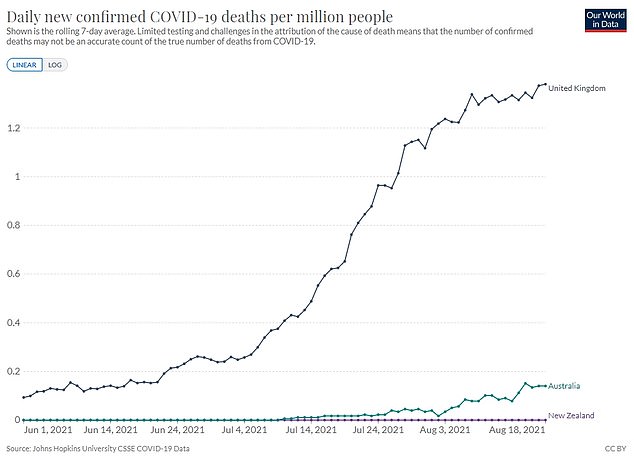
It comes just days after NSW Health admitted they have all but given up on listing exposure venues in virus-plagued Sydney.
Instead, health officials will concentrate on public alerts in regional areas and venues in the Harbour City deemed ‘high-risk’.
Chief Health Officer Kerry Chant told reporters the R-rate will need to drop below 1 before any improvements can be made in the case numbers.
She desperately reiterated her daily message on Wednesday morning calling on NSW residents to stay at home and abide by the state’s harsh lockdown measures which are now in their eighth week in Sydney.
‘Every person is passing on the virus to more than one person, so we are continuing to see case numbers increase,’ she said.
‘You might have one person who has connections across three households, but in each of those households you’ve got tens of people. And we know that household transmission for Covid is so common.’
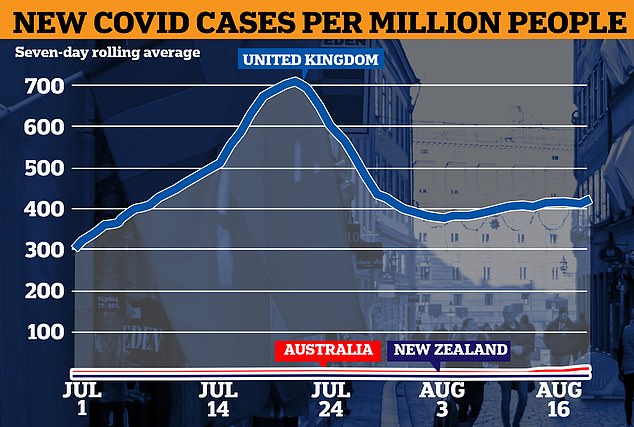
New Zealand and Australia have seen very few Covid cases per capita, one of the benefits of pursuing ‘zero Covid’ policies – despite leaving multi-billion dollar holes in their economies. But there are signs Australia’s crisis could spike in the coming weeks amid the spread of the viciously infectious Delta variant, which has raised fears in New Zealand
Of the 633 new cases, about 550 are young people and workers in Sydney’s areas of concern in the west and southwestern suburbs where transmission of the virus to household contacts remains the leading cause of infections.
Premier Gladys Berejiklian specifically called out residents in Merrylands, Guildford, Auburn, Greenacre, Yagoona, St Marys and Strathfield, urging them to ‘stay at home’ and not visit other households.
‘Stay at home. Don’t break the rules, everybody knows what they mean. Just a small number of people are choosing to ignore what the rules are,’ she said.
Meanwhile, in New Zealand, Ardern warned that Kiwis must brace for additional Covid-19 cases from the outbreak that plunged the previously virus-free country into a snap lockdown.
New Zealand had been virus-free and living without curbs until Prime Minister Jacinda Ardern ordered a snap 3-day nationwide lockdown on Tuesday after a single case, suspected to be Delta, was found in the largest city Auckland.
The number of COVID-19 cases had risen to 10 on Wednesday, although modelling suggested numbers could rise to 50-100.
‘From the experience of what we’ve seen overseas, we are absolutely anticipating more cases,’ Ardern said.
She said one of the new cases was a nurse at Auckland Hospital and another was a teacher at a high school, both representing high-risk environments for rapidly spreading the virus.
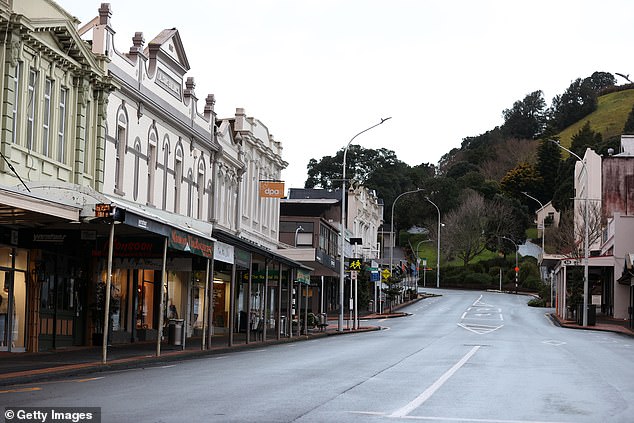
Kiwis were put into an intense level four lockdown on Tuesday after the country’s first community case in six months, with at total of 10 cases now linked to the cluster. Seen here is a deserted street in Devonport on Wednesday
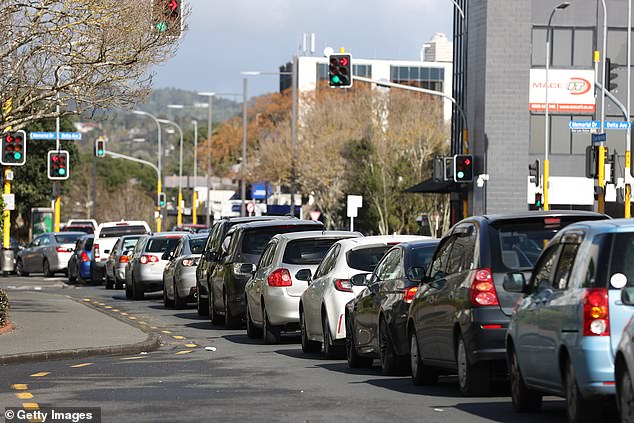
Gridlock in New Lynn as people queue for COVID-19 testing around Totara Health in Auckland, New Zealand
‘We’re expecting more,’ she said as officials revealed modelling predicted the cluster grow to 120 cases, even with stringent restrictions in place.
It is the first sign the mutant strain could undermine the 19 months of economically-crippling restrictions New Zealanders have had to endure to pursue the elimination strategy.
Scientists have warned ‘zero Covid’ is near impossible with the Delta strain, which is many times more infectious than the original virus that emerged in China.
The initial infection, a 58-year-old Auckland man, ended a six-month run without community transmission in New Zealand, which has recorded only 26 Covid-19 deaths in a population of five million since the start of the pandemic.
Ardern said investigators were trying to work out how the man caught the strain linked to Australia.
‘Our case has originated in Australia, now the job we have is to work through how and when it got here,’ she said.
‘The natural place to start is to look at our managed isolation (border) facilities.’
The move to lockdown will put the country ‘in a much less risky position’, she added at a media conference.
New Zealand will be in level 4 lockdown, the highest alert level, for at least three days, while Auckland will remain in lockdown for seven days.
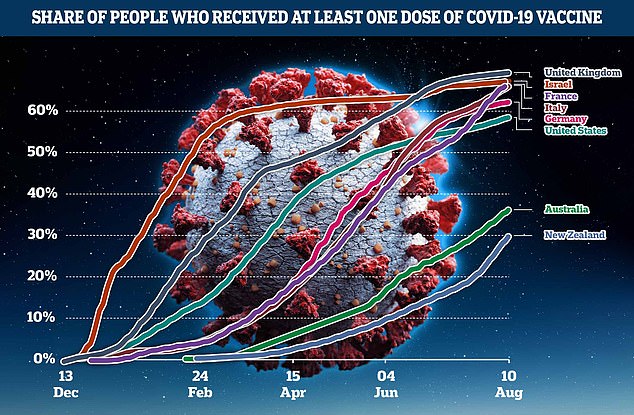
The vaccine rollout in Australia and New Zealand has been much slower than in most developed nations, with under 20 per cent of the population fully inoculated
Ardern said genome sequencing had shown the Auckland case was linked to an outbreak in neighbouring Australia’s New South Wales state, but it was still not clear how Delta had entered the community.
The national lockdown – New Zealand’s first in 15 months – is scheduled to last three days, with Auckland and the nearby Coromandel area facing restrictions for a week.
In the capital Wellington, few people ventured out in the city centre, which would normally be bustling with shoppers and office workers, while television footage showed similar scenes in Auckland.
Panic buying erupted after the lockdown announcement on Tuesday, with people stocking essentials at supermarkets despite repeated assurances from the government that there will be no shortage in supplies.
Meanwhile, Businesses and schools scrambled to move online.
Ardern has won praise for containing local transmission of COVID-19 via an elimination strategy, imposing tough lockdowns and shutting New Zealand’s international border in March 2020.
The last reported community case of COVID-19 in New Zealand was in February, with about 2,500 confirmed cases overall and 26 deaths, and citizens have been living without restrictions.
Ardern’s success helped her secure a second term in office, but her popularity is being dented by delays to a vaccine rollout, as well as rising costs in a country heavily reliant on an immigrant workforce.
Just over 21 per cent of the country’s 5 million people have been fully vaccinated so far, the slowest among OECD nations.
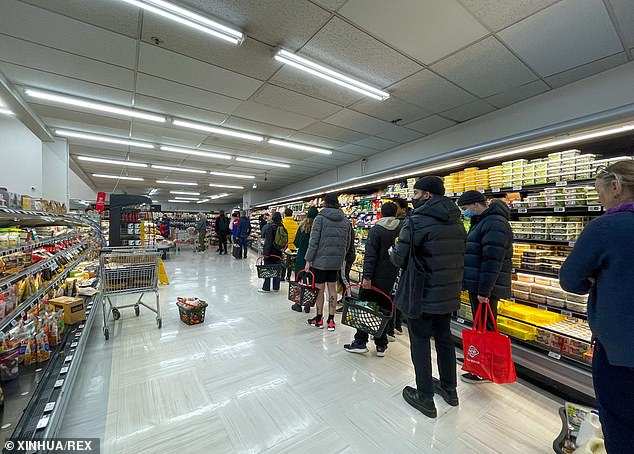
The latest lockdown came into effect at midnight on Wednesday, sparking panic buying in New Zealand supermarkets, as seen here in Wellington
Dozens of people gathered in Auckland and other cities to protest against the lockdown.
Police confirmed that four people were arrested at an anti-lockdown gathering in Auckland, and some others were also taken into custody in two other cities.
Ardern said there had been three positive border cases this month from Sydney, where an outbreak continues to rage even though stay-at-home orders have been in place since late June.
Director-General of Health Ashley Bloomfield said there were no obvious links between the border cases from New South Wales – of which Sydney is the capital – and the seven-strong cluster in Auckland, four of whom were flatmates in their 20s.
‘They’ve been out and about a lot and I’m flagging there will be large numbers of places of interest,’ Bloomfield added, saying some of the flatmates had visited a church and Auckland’s Sky City casino.
Ardern was confident that even with more cases, her government’s strategy of eliminating the virus, rather than just containing it, would succeed.
‘Yes, Delta poses a greater threat, but the same tools that have worked before will do so again if we follow the rules,’ she said.
She said wastewater testing in Auckland had detected no sign of the virus, giving cause for optimism.
Police confirmed four people had been arrested at a small anti-lockdown protest in Auckland, with supporters of high-profile conspiracy theorists Billy Te Kahika saying on his social media platforms that he was among those detained.
‘It is disappointing that some choose to put others at risk,’ Ardern told reporters, saying most people were following the rules.
The Reserve Bank of New Zealand cited the latest lockdown as a reason for keeping its base interest rate at a record low of 0.25 percent.
Analysts had predicted before the outbreak that the central bank would lift rates amid improving economic signs.
‘Today’s re-introduction of Level 4 restrictions to activity across New Zealand is a stark example of how unpredictable and disruptive the virus is proving to be,’ it said.
Opposition National Party leader Judith Collins said the country had little choice but to go into lockdown.
‘If there’s a failure, it is around getting vaccinations into the country and then getting them into people,’ she told state broadcaster 1News.
Finance Minister Grant Robertson said the government will reinstate a wage subsidy from Friday if the country is still in lockdown.
Source link : https://www.dailymail.co.uk/news/article-9906799/Australia-sends-TROOPS-guard-state-borders-cases-spiral-locked-Sydney.html











